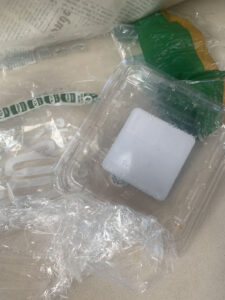Buying back soft plastic recycled products
By Bruce Thompson
It’s all about supply and demand. With an oversupply of soft plastics collected and not enough of recycled products being purchased, we need to look at what is required to ensure the recycling program continues.
In late 2022, many Australians who had been diligently collecting their soft plastics and taking them to Woolworths, Coles and Aldi supermarkets to place into REDCycle bins, woke to the news that REDCycle had temporarily ceased their collection service. REDCycle’s explanation for their announcement was the 350% increase in soft plastics collection since 2019 coupled with a factory fire at their major recycling customer for the soft plastics, Close the Loop, had led to the unsustainable stockpiling of soft plastic bales in warehouses.
With a reduction of factories that would take the soft plastics to convert into Close the Loop TonerPlas™ road surfaces, Plastic Forests’s garden beds and wheel stops, and Replas’s raised garden beds, bollards, park furniture and Polyrok™ concrete aggregate replacement, the five million per day of post-consumer plastic items collected by REDCycle were not finding a home. In other words, we as consumers weren’t buying back the soft plastics in other forms. We had become very good at collecting soft plastics, thinking we were being good recyclers, when in reality, what we actually needed to do was buy products made out of those soft plastics to ensure demand.
With many soft plastics recycled products being garden related, the horticulture industry now has a significant role to play as both demonstrators and advocates of a soft plastics circular economy. If you’re building raised garden beds for schools, corporate and residential clients, Plastic Forests and Replas raised garden beds should be your first choice for procurement to help activate the soft plastics collection process again, which REDCycle hopes will recommence in June 2023.
NSW residents may still be able to collect soft plastics through the ‘Curby It’ soft plastics recycling scheme operating at the City of Newcastle and Central Coast Councils.
Please also be mindful of avoiding waste at its source by not using soft plastics wherever possible. Consider replacing cling wrap plastics for plant transport with cardboard or use bio-fill packaging materials such as corn starch packing peanuts and cardboard honeycomb void instead of bubble wrap. Moistened newspaper in re-purposed polystyrene fruit boxes keeps plants moist and protected for transport without creating unnecessary consumption destined for landfill.
With 4% of the global oil supply dedicated to plastic production, if we keep relying on plastic as a material, we will not just be environmentally wreaking havoc but economically as well. Metal objects placed in recycling bins are high demand, high price commodities that ensure the financial viability of Materials Recovery Facilities (MRFs), so aluminium and steel packaged items should always be preferred over plastic package items.
Between 30% and 75% of the content of every newly created steel and aluminium object has been recycled previously. With garden pots being made out of Number 5 PP (polypropylene), which is currently being collected as ‘mixed plastics’ at MRFs and then stockpiled, if the Australian Government is unable to legislate and subsidise the development of local products and markets for these materials, product development to make garden pots from fully recyclable materials such as aluminium will be warranted.
For decorative garden pots made out of recycled HDPE plastic lids, contact your local Precious Plastics organisation to ensure demand for these items only.
The collapse of REDCycle poses a threat to the entire Australian recycling industry. so please exercise your consumer sovereignty by choosing recycled plastics over virgin plastics, and support materials research and development that will eventually bring an end to the Age of Plastic.
With the Australian Government’s Minister for the Environment and Water, Tanya Plibersek, signing Australia to the High Ambition Coalition to End Plastic Pollution around the world by 2040, with plastic production predicted to triple by 2060 and the amount of plastics in the ocean set to outweigh fish by 2050, I look forward to the Australian Government legislating minimum recycled content for plastics consumption, subsiding a financially sustainable circular economy for plastics and environmentally sound management of waste plastics.
Plastic is made from finite resources – oil and gas; it needs to continue on the planet as a resource in a recycled form or remain sequestered in the Earth.
Bruce Thompson
M: 0404 806 022
E: brucerogerthompson@hotmail.com
Main photo: Avoid using soft plastics where possible (Image: Karen Smith)

